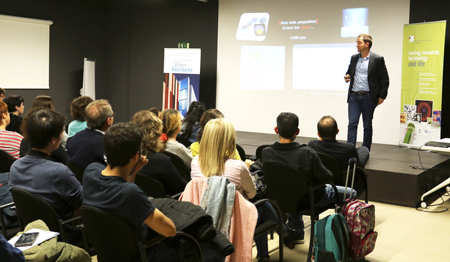Samuel wows crowd with nanorobots talk
 Yesterday evening, an audience of nearly a hundred enjoyed a special public seminar by IBEC group leader and ICREA research professor Samuel Sánchez.
Yesterday evening, an audience of nearly a hundred enjoyed a special public seminar by IBEC group leader and ICREA research professor Samuel Sánchez.
The Smart nano-bio-devices group leader’s talk, Nanorobots de la ciència-ficció a la realitat, which took place in the PCB’s Sala Dolors Aleu, was one of this year’s Setmana de la Ciència events.
Young and old alike enjoyed Samuel’s evolution of the nanorobots he has been working on for the past few years – their shape, speed and controllability improving all the time, as well as finding new and better methods of propulsion – and he began by dispelling some science fiction myths about what sort of things such nanomachines might expect to encounter on their journeys through the human body.


